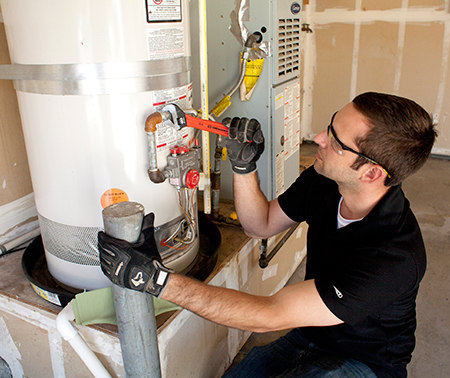
Image Source: Google
Hot water is an essential part of our daily lives, whether it's for showering, cooking, or doing laundry. Your water heater plays a crucial role in providing you with this comfort. However, like all appliances, water heaters have a limited lifespan. Knowing when it's time to replace your water heater can save you from unexpected cold showers and potential water damage. Here are five signs that indicate it's time for a water heater replacement services:
1. Age of the Water Heater
Water heaters typically last between 8 to 12 years, depending on the type and model. If your water heater is approaching or has surpassed this age range, it's a good idea to start considering a replacement, even if it's still functioning. An older water heater is more prone to leaks and breakdowns, which can lead to costly repairs or water damage in your home.
Signs that your water heater is aging:
- Visible rust or corrosion on the tank
- Rumbling or banging noises during operation
- Inconsistent water temperature
2. Water Quality Issues
If you notice changes in the quality of your hot water, such as a metallic taste, discolored water, or a foul odor, it could be a sign that your water heater is deteriorating on the inside. As water heaters age, sediment buildup can occur at the bottom of the tank, affecting the taste and appearance of your hot water. In some cases, this buildup can even lead to bacterial growth, posing a health risk to you and your family.
Signs of water quality issues:
- Metallic taste or smell in the hot water
- Rusty or discolored water coming from the taps
- Sediment or particles in the water
3. Leaks or Moisture Around the Water Heater
One of the most obvious signs that your water heater needs to be replaced is the presence of leaks or moisture around the unit. A leaking water heater can cause water damage to your floors, walls, and belongings, leading to costly repairs and potential mold growth. In some cases, a leak can be repaired, but if your water heater is old and showing other signs of deterioration, it's best to replace it to prevent future leaks.
Indications of leaks or moisture:
- Puddles of water around the water heater
- Damp or discolored walls or floors near the unit
- Mold or mildew growth in the vicinity of the water heater
4. Inadequate Hot Water Supply
If you find yourself running out of hot water more frequently or if the water temperature fluctuates unexpectedly, it could be a sign that your water heater is struggling to keep up with your hot water demands. Over time, sediment buildup, corrosion, or a faulty heating element can reduce the efficiency of your water heater, resulting in inadequate hot water supply.
Indications of an inadequate hot water supply:
- Hot water running out quickly during showers or baths
- Fluctuating water temperature when using hot water
- Longer heating times for water to reach desired temperature
5. Increased Energy Bills
An old or inefficient water heater can lead to higher energy bills due to increased energy consumption. As water heaters age, they lose efficiency, requiring more energy to heat the same amount of water. If you notice a sudden spike in your energy bills without a corresponding increase in hot water usage, it could be a sign that your water heater is on its last legs.
Signs of increased energy bills:
- Sudden or unexplained increase in energy costs
- Consistently high energy bills despite no change in usage
- Water heater running more frequently or for longer periods
Don't ignore these signs that your water heater needs replacement. By being proactive and replacing your water heater before it fails completely, you can avoid the inconvenience of a sudden breakdown and the potential damage it can cause to your home. Consult a professional plumber to assess your water heater and recommend the best course of action based on your specific situation.